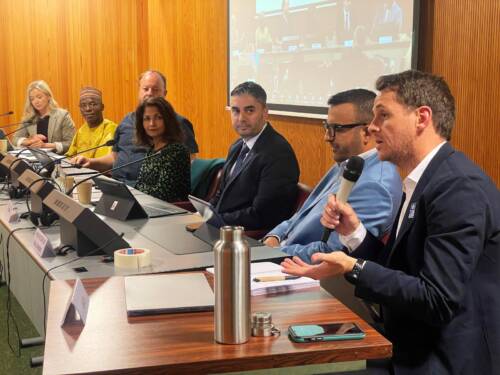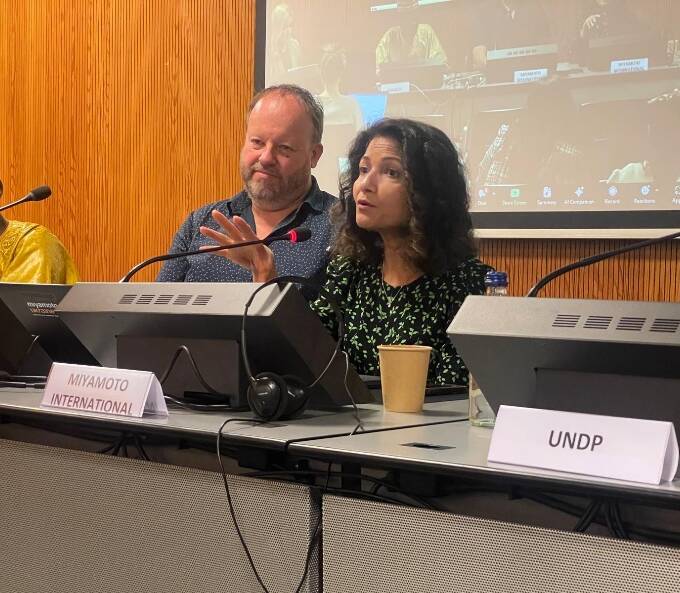During the recent Humanitarian Networks and Partnerships Weeks, Miyamoto International showcased the firm’s pivotal role in reshaping the private sector perspective into an active agent in disaster aftermath management, bringing global knowledge engineering and proactive training initiatives to the forefront.
Key Insights on Private Sector Collaboration

Principal Unjela Kaleem and Director of Shelters and Settlements, David Hodgkin, in ‘Unlocking Development Solutions in Crisis Context: Public-Private Partnership and Innovation’ .
One key takeaway from the session is the critical role of collaborations within the private sector, highlighted by Unjela Kaleem, Principal at Miyamoto International. “Often the concept of private sector, when you talk from the multilateral or UN perspective, is taking a shift […] looking at the private sector, not just as a big pool of money provider, but actually organization and companies working as operational partners,” she explained.
David Hodgkin, Director of Shelters and Settlements at Miyamoto International, emphasized the significance of shared knowledge in a localization context. “We are not trying to push people out; we’re trying to share everything we can […] We are there in every way to support every other local actor that we possibly can,” he stated.
Impactful Partnerships in Ukraine

Audience in the session ‘Unlocking Development Solutions in Crisis Context: Public-Private Partnership and Innovation’ at the Humanitarian Networks and Partnerships Weeks 2024
A compelling example of such a partnership’s impact can be seen in Ukraine following the discovery of asbestos in most damaged buildings. Miyamoto International collaborated closely with Ukraine government agencies to address the severe health risks posed by asbestos exposure during the post-disaster cleanup and rebuilding efforts. By integrating Miyamoto’s technical expertise and technology with local knowledge and collaborators, the joint initiative not only expedited safe debris removal but also implemented stringent safety protocols to protect workers and residents from hazardous exposure.
Inclusive Collaboration and Trust Building
Ambassador Aminou Akadiri added a poignant reminder: “We used to hear about a middleman, but I think there is no more about who can be a middleman; it is how we can collectively work together. How we can bring back the trust. As the government, international donor, and private sector, we come together to work.”
Building Resilience in Afghanistan
In Afghanistan, Miyamoto worked closely with the Humanitarian Country Team to conduct a comprehensive geo-technical

Panelists from left to right, Emma Jones (Moderator), Ambassador Aminou Akadiri, David Hodgkin, Unjela Kaleem, Fabjan Lashi, Dogan Celik, and Sean O’Conell.
analysis across the earthquake-affected areas. It also played a pivotal role in enhancing local capacities through specialized training programs focused on safe construction practices and disaster resilience. Understanding the unique challenges
posed by the region’s seismic activity, Miyamoto’s initiatives included training local engineers, builders, and community leaders in earthquake-resistant construction techniques. These training sessions were designed to transfer crucial vernacular knowledge and skills, ensuring that communities could rebuild safer and more durable structures post-disaster.
These case studies, provided in the session on Unlocking Development Solutions in Crisis Context: Public-Private Partnerships and Innovation, are an ongoing proof to the power of collaboration and innovation in building resilient communities, capable of facing and overcoming the challenges posed by disasters. This is a call to action for more organizations to engage in meaningful public-private partnerships, sharing knowledge and resources to better prepare and respond to our world’s most pressing challenges, making the world a better, safer place.

